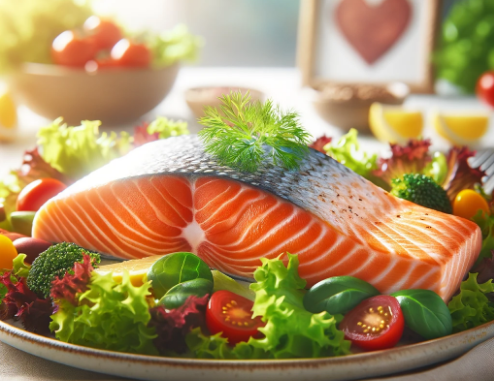
ADVERTISEMENT
Understanding high cholesterol and its impact on health is crucial. Cholesterol, a fatty substance in the blood, can build up and lead to cardiovascular diseases when levels become too high. This guide explores the role of high-protein foods in managing high cholesterol, offering nutritious options that can help maintain a balanced and heart-healthy diet.
High-Protein Foods for High Cholesterol
The Importance of Protein in Managing Cholesterol
Protein plays a key role in managing high cholesterol. Unlike some fats that can exacerbate cholesterol levels, protein provides essential nutrients without the added risk. This section delves into how high-protein foods contribute to a cholesterol-friendly diet.
Donald Trump’s Hollywood Enemies List: These Stars Are at the Top!
Criteria for Selecting High-Protein Foods
Selecting the right high-protein foods is vital. This part outlines the criteria, such as low saturated fats, high omega-3 fatty acids, and fiber content, which can influence cholesterol levels positively.
Fish: A Heart-Healthy Protein
Benefits of Omega-3 Fatty Acids
Fish, particularly fatty types like salmon and mackerel, are rich in omega-3 fatty acids, known for reducing inflammation and improving heart health. This segment highlights the benefits of incorporating fish into a cholesterol-lowering diet.
Nuts: A Crunchy Way to Lower Cholesterol
Types of Nuts to Include
Nuts are not only delicious but also packed with nutrients that can help lower cholesterol. Almonds, walnuts, and pistachios, among others, offer a hearty dose of healthy fats and protein.
What’s Really Going On with Barron Trump? The Hidden Truth Finally Uncovered!
Legumes: Plant-Based Protein Powerhouses
The Versatility of Legumes
Legumes, including beans, lentils, and chickpeas, are excellent sources of plant-based protein. This section explores how legumes can be a versatile component of any diet aimed at managing cholesterol.
Avocado: The Creamy Superfood
Avocado and Heart Health
Avocado is a unique fruit with monounsaturated fats that can help reduce bad cholesterol levels while being a satisfying addition to the diet.
The Dark Secrets Behind Donald and Melania Trump’s Relationship—What’s Really Happening?
Whole Grains: The Fiber-Protein Combo
Selecting the Best Whole Grains
Whole grains, such as quinoa, barley, and oats, provide a dual benefit of protein and fiber, supporting heart health by helping manage cholesterol levels.
Lean Poultry: A Low-Fat Protein Source
Preparing Poultry the Healthy Way
Lean poultry, when prepared without the skin and with minimal added fats, can be a great low-fat source of protein, ideal for those monitoring their cholesterol intake.
Dairy: The Right Types for Cholesterol Management
Choosing Low-Fat Dairy Options
Dairy products can be part of a cholesterol-lowering diet if the right types are chosen. Low-fat and non-fat options provide calcium and protein without the high levels of saturated fat.
Incorporating high-protein foods into your diet can play a significant role in managing high cholesterol. By choosing the right foods, such as fish, nuts, legumes, avocado, whole grains, lean poultry, and low-fat dairy, you can enjoy a diverse, nutritious diet that supports heart health.
FAQs
ADVERTISEMENT
- Can high-protein diets help in reducing cholesterol levels? Yes, especially when they include foods rich in omega-3 fatty acids, fiber, and healthy fats.
- Are all types of fish beneficial for cholesterol? Fatty fish are particularly beneficial due to their high omega-3 content.
- Can eating nuts increase cholesterol because of their fat content? Nuts contain healthy fats that can actually help improve cholesterol levels.
- Are there vegetarian options that are high in protein and good for cholesterol? Yes, legumes and whole grains are excellent plant-based sources of protein that can benefit cholesterol levels.
- How often should I include high-protein foods in my diet to manage cholesterol? Incorporating these foods into your daily diet, as part of a balanced and varied meal plan, is recommended for the best results.
I know I don’t eat right but by time I get my bills paid,not much left for food.
Excellent articles! We do eat fish , legumes , avocados! The articles are rich in information,
This was a great, healthy read! TY
Thank you very much for a beautiful article about an protein based foods.
Enjoyed article on protein and cholesterol, I am eating more protein and slowly losing weight, almost at my goal.
Thank you for the information it was greatly appreciated. Have a blessed day.
Thank you. Trying with doing. Smiles
Thank you. Trying with doing. Smiles
Thanks so much Denzel Washington for the rightful recommendation for my healthy lifestyle.
Well I’ve been eating scumbia especially. I’ll hence forth try adding your recommendation as it’s proven essential for a healthier me
It seems like fish salmon plays a miserable and everything. One thing I don’t like is avocado so I won’t be eating any of that. Well, thanks for the article article something that I learned again today.
Thank you so much,I appreciate it